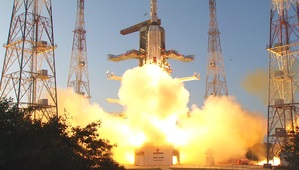The successful orbiting of India's third generation weather satellite INSAT-3DS in a copybook style on Saturday has enhanced the confidence about the Geosynchronous Satellite Launch Vehicle (GSLV) rocket for the next prestigious launch, said officials of Indian space agency.
The GSLV rocket (formerly GSLV-MkII) had earned the nickname 'naughty boy' during its initial days for its inconsistent performance.
"The confidence on the GSLV rocket is now high," S. Somanath, Chairman, Indian Space Research Organisation (ISRO) said.
He said the next space mission for the GSLV rocket will be the launch of Indo-US collaboration earth observation satellite NASA-ISRO Synthetic Aperture Radar (NISAR).
On Saturday, the 'naughty boy' came to a lot of praise from the ISRO officials starting from Somanath.
S.Unnikrishnan, Director, Vikram Sarabhai Space Centre (VSSC) said the 'naughty boy' has now become smart and everything pertaining to the mission went off smoothly.
"The naughty boy has matured and has become a disciplined boy now. The rocket had injected the satellite in its intended orbit, said Tomy Joseph," Mission Director of GSLV-F4/INSAT-3DS.
Joseph also said the rocket had carried 50 kg more weight than what was carried in the earlier mission.
According to the Satellite Director, Imteyaz Ahmad, the four metre diametre heat shield is important as it enables to build bigger satellites.
V.Narayanan, Director, Liquid Propulsion Systems Centre said the payload capacity of the rocket has been increased from about 1,500 kg first to 2,274 kg now – the weight of the INSAT-3DS satellite. According to M. Sankaran, Director, U R Rao Satellite Centre, INSAT-3DS life span has now extended by three months -- mission design life 10 years -- owing to the orbit achieved.
A. Rajarajan, Director, Satish Dhawan Space Centre said the launch campaign went off without any hitch and the centre is gearing up for the next rocket launch.


New AI algorithm to predict risk of cardiovascular events, heart-related death
A team of researchers in South Korea has developed a novel artificial intelligence (AI)-based algorithm that uses electrocardiograph (ECG)2 data to predict the risk of cardiovascular events, and heart-related death.
India successfully flight-tests indigenously-developed vertically-launched Surface-to-Air Missile
In a boost to India's precision firepower, the Defence Research & Development Organisation (DRDO) and the Indian Navy conducted the successful flight-test of indigenously-developed Vertically-Launched Short-Range Surface-to-Air Missile (VLSRSAM) on Wednesday, an official statement said.
Unplanned welcome: Dolphins greet astronauts as they return home after extended space mission
Astronauts Sunita Williams and Butch Wilmore, along with NASA’s Nick Hague and Russian cosmonaut Aleksandr Gorbunov, have returned to Earth after a lengthy journey that turned a planned eight-day mission into a nine-month in space.
Stranded US astronauts return to Earth, after nine months in space
The SpaceX Dragon spacecraft carrying them and two other astronauts—Nick Hague and Russian cosmonaut Aleksandr Gorbunov—splashed down into the waters off the coast of Florida state just minutes before 6 p.m., as NASA had announced.
Google to acquire cloud security platform Wiz for $32 billion
Tech major Google on Tuesday announced to acquire Wiz, a leading cloud security platform headquartered in New York, for $32 billion in an all-cash transaction.
Ahead of Sunita William’s ‘homecoming’, PM Modi pens letter to India’s illustrious daughter
As the NASA astronauts Sunita Williams and Butch Wilmore begin their journey back home from space, after staying ‘stranded’ at the International Space Station (ISS) for about nine months, Prime Minister Narendra Modi has written a letter to one of India’s most illustrious daughters hoping for her safe return.
Sunita Williams set to return to Earth tomorrow
With the pair of US astronauts stranded for more than nine months on the International Space Station (ISS), the National Aeronautics and Space Administration (NASA) has confirmed that the duo will return to Earth on Tuesday evening.
SpaceX crew-10 docks at ISS, to bring home Sunita Williams, Butch Wilmore this week
SpaceX's Crew-10 mission successfully docked at the International Space Station (ISS) on Sunday, bringing hope for the return of two NASA astronauts -- Sunita Williams and Butch Wilmore -- who have been stuck in orbit for months.